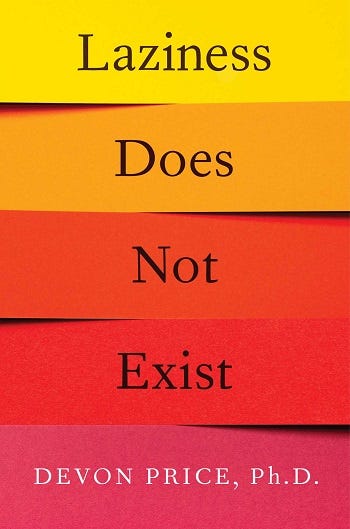
I could have written this post yesterday. Instead, after reading an excellent article by Devon Price about how Laziness Does Not Exist, I chose not to. Instead, I decided to go play video games for nearly 3 hours, then have dinner, play video games with friends (Fall Guys) and then play more video games from 11 PM to nearly 3 AM (It’s Ghost of Tsushima , if you’re curious).
Am I lazy? Why didn’t I just write this article instead of slacking off? What does it say about my character that even though I had hours of opportunities to write this I didn’t?
According to Price? Nothing.
…[W\hen I see a student failing to complete assignments, missing deadlines, or not delivering results in other aspects of their life, I’m moved to ask: what are the situational factors holding this student back? What needs are currently not being met? And, when it comes to behavioral “laziness,” I’m especially moved to ask: what are the barriers to action that I can’t see?
Taking Price’s line of reasoning here what were my barriers to action that others may not see?
Well, I’d already done some organizing for a D&D session during my birthday in a couple of weeks. I read some other articles before that and generally didn’t feel like overwhelming myself. I felt a strong urge to do something to just relax and get lost in and I felt video games fit that need of mine better than writing did. I was also aware that this site is completely run by me (even if it’s just an unconscious recognition at this point) and that I make my own deadlines.
But do all these barriers say something about my character? Nope. They’re just circumstances I find myself in and I react however I feel best able to in the moment. My ability to “recognize those barriers—and viewing them as legitimate” is key in me still finding enjoyment in writing.
Consider an alternative scenario: I shame myself heavily for not writing. I tell myself I’m a failure and that this just further proves I can’t commit to anything without messing it up. What would that do for me? According to Price it would do the opposite of helping:
It has nothing to do with desire, motivation, or moral upstandingness. Procastinators can will themselves to work for hours; they can sit in front of a blank word document, doing nothing else, and torture themselves; they can pile on the guilt again and again — none of it makes initiating the task any easier. In fact, their desire to get the damn thing done may worsen their stress and make starting the task harder.
…
The solution, instead, is to look for what is holding the procrastinator back. If anxiety is the major barrier, the procrastinator actually needs to walk away from the computer/book/word document and engage in a relaxing activity. Being branded “lazy” by other people is likely to lead to the exact opposite behavior.
I can shout, hurl insults, negative self-talk and curse myself out for existing all I want but what good will it do me? And even if it got me to write the damn thing, what would it accomplish? I’d likely still see myself as a failure or that the article suffered because I guilt myself so feverishly. This would only keep the cycle of self-hatred going and affect my writing even more!
No, there’s no point in self-shaming yourself over what you can’t find in yourself to accomplish. Ask yourself this question: Even if shaming got you to where you needed to be: Would it be worth it? Would it be worth constantly denigrating, belittling and emotionally harming yourself just to check something off on a checklist for the day? How much is the assignment you’re berating yourself really worth? Is it worth your self-esteem or your sense of well-being? I doubt it.
Shame is a powerful social tool but it’s often too strong for what we think is necessary. Guilt isn’t necessarily a bad thing to feel. Feeling remorse for past wrongs isn’t a fault and telling yourself you should have and need to do better isn’t either! But shame doesn’t work like that, as we’ve been talking about in the last couple of articles. Shame builds secrecy, it makes people take out their anger on themselves instead of focusing that energy on progress for themselves.
So OK, you get it, self-shaming doesn’t work.
Well, Price thinks their so smart so what is the solution then?
The class & I talked about the unfair judgments people levy against those with mental illness; how depression is interpreted as laziness, how mood swings are framed as manipulative, how people with “severe” mental illnesses are assumed incompetent or dangerous.
The quiet, occasionally-class-skipping student watched this discussion with keen interest. After class, as people filtered out of the room, she hung back and asked to talk to me. And then she disclosed that she had a mental illness and was actively working to treat it. She was busy with therapy and switching medications, and all the side effects that entails. Sometimes, she was not able to leave the house or sit still in a classroom for hours. She didn’t dare tell her other professors that this was why she was missing classes and late, sometimes, on assignments; they’d think she was using her illness as an excuse. But she trusted me to understand.
Support! As I talked about in the previous article with regards to addiction (and of course mental health issues and addiction often go hand and hand), support from your peers is one of the most important things people can have. If I didn’t have my loving and supportive partner, my close friends or my online communities, I’m not sure what I’d be doing right now. I’d still probably be just as preoccupied with hating myself and wishing I could’ve done X or Y over again.
But just like with “laziness” these things don’t help me. They make me feel worse while helping no one around me. It makes me spiral into the pits of despair and self-hatred and eventually those emotions need to be let out somehow and often they’ll be on people I love and care about. I don’t want to be that person anymore and so I have to strive to do better, not wallow in self-pity.
And what happens when this kind of support is given?
Price explains:
These students all came to me willingly, and shared what was bothering them. Because I discussed mental illness, trauma, and stigma in my class, they knew I would be understanding. And with some accommodations, they blossomed academically. They gained confidence, made attempts at assignments that intimidated them, raised their grades, started considering graduate school and internships.
Success! Support leads to success! It’s almost like making folks feel ashamed of themselves by forcing them to go to work camps or go to prison is a bad idea! It’s almost like manipulatively hosting summer field picking jobs is a way to reinforce to people that they need to be productive or else they’re not leading a “full” life, even in retirement!
As Price says, y’all aren’t lazy. And even if you were, it’s OK to be lazy and take care of yourself when you need to do so. There’s a need that you feel isn’t being met at that time and that’s valid and so important to listen to. It should be better respective and legitimized in today’s society. But sadly, we live under a capitalist regime so that kind of legitimacy won’t be afforded anytime soon.
If I had one quibble with Price’s (excellent) piece, it’s that while laziness as a moral status doesn’t exist, I think it’s very much the case that laziness as a neutral status does. Yeah, maybe I was being lazy yesterday when I didn’t want to write immediately after reading an article that mentions mental health, sexual assault, and trauma, but you know what?
That’s OK, because I’m here now and I wrote it, didn’t I?
If you enjoyed this article, consider donating to my Patreon!
